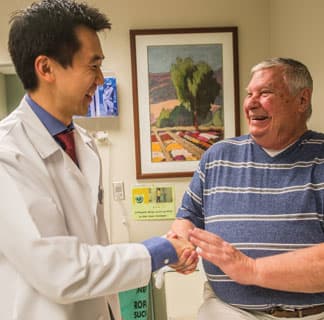Triathlete outpaces prostate cancer, treatments

Dave Hicks knows how to pace himself during competitions. The 66-year-old runner has been doing just that since his first race in 2001, when he was 49.
So, in February 2013, when diagnosed with localized stage 4 prostate cancer, Hicks leaned on his years of training to endure a marathon of treatment — while still preparing to run 26.2 miles.
He had surgery to remove his prostate in April and ran the Chicago Marathon that October. He used the race to raise funds for the American Cancer Society’s “Making a Difference” campaign and persuaded his daughter, Stephanie, then 35, to run with him. They crossed the finish line together and collected more than $12,000 in donations.
Then, in April 2015, he had a recurrence.
Hicks went through hormonal therapy followed by eight weeks of highly focused radiation therapy to the prostate bed and pelvis. This typically causes fatigue, as well as other side effects.
Dave's story
But it did not dissuade Hicks, 63 at the time, from entering the race and training all summer for the 2015 Chicago Marathon.
“Training and fundraising help me find some good in my cancer condition,” he said. “Maybe I can be an inspiration to other charity runners and cancer patients.”
In the long run, radiation therapy
His medical team at the University of Chicago Medicine could not recall another patient training for a marathon during hormonal therapy and radiation. But they were supportive of Hicks, who made his daily 18-mile round trips for treatment on his bike. On a good day, he could do the distance in an hour.
“His overall fitness and consistent activity level made a difference,” said radiation oncologist Stanley Liauw, MD, a triathlete himself. “Exercise helped mitigate treatment-related fatigue and was great for his attitude. He’s an inspiration, for me and for other patients.”
Hicks received his last radiation treatment on Oct. 1, 2015. He began to taper off and fuel up. On Oct. 11, race day, it was hot and humid, but Hicks pushed through it with a time of five hours, 35 minutes and 54 seconds. He crossed the finish line with his son, Tom, who, along with Stephanie and her husband, Geoff Feinblatt, raised over $21,000 for the cancer society as “Team Hicks.”
Going farther still
With marathons under his belt, Hicks turned his attention to triathlons.
“Last fall, I decided I was within striking distance to finish an Ironman 70.3 triathlon,” he said. “If I put my time and attention to it — and Dr. Liauw has been very supportive — I felt I could handle that seven- to eight-hour race. I didn’t have to be competitive. I just wanted to finish.”
He and his wife, Julie, began training in earnest in January 2018. They completed two shorter Olympic distance triathlons (0.9-mile swim, 28-mile bike ride, 6.1-mile run) in June.
In July, he finished an unofficial half Ironman, a distance of 70.3 miles.
“That went well,” Hicks said. “So, I felt hopeful going into my first official Ironman 70.3 race in August in Benton Harbor, Michigan.”
He’s an inspiration, for me and for other patients.
He had a rough start. It was a hot day, with 80s in the morning, then low 90s. Because of the heat, he couldn’t swim in a wetsuit, which would have helped his buoyancy and speed. No wetsuit plus Lake Michigan waves made the swim, as he described it, “miserable.”
He finished the 1.2-mile swim in 74 minutes — last in his age group. But he gained it back on the bike. He pedaled 56 miles in 3 hours, 20 minutes, then ran half of a marathon, 13.1 miles, just under 2 hours, 50 minutes.
“I felt strong at the end, finished strong, not too dehydrated,” he said. “I wasn’t even sore the next day.”
Hicks, who has been retired since 2014, doesn’t plan to slow down. He’s been in remission for more than three years.
“I enjoy traveling, training and raising money for cancer research,” he said. “It feels good to build my body back up from the cancer treatments and to give something back. Besides, Julie and I put in 18 to 20 hours a week training.
“Consequently,” he said, “I’m busy every day and never bored. I’m already working on how I can be more competitive in my Ironman-70.3 age group for next year.”
Cancer Can't Compete
Cancer survivor Anthony Rizzo is teaming up with the Chicago Tribune, along with the Anthony Rizzo Family Foundation, Mariano’s and the University of Chicago Medicine, in a campaign to raise money for cancer research and support for families as they fight cancer together.
Cancer Can't Compete
Prostate Cancer Care
The UChicago Medicine prostate cancer care team is highly skilled in the most up-to-date, technologically advanced methods for the diagnosis and treatment of prostate cancer. We offer the full range of treatment options, including robotic surgery, clinical trials of new therapies, sophisticated radiation oncology care, genetic testing for hereditary risk factors and more.
Prostate Cancer Care Services